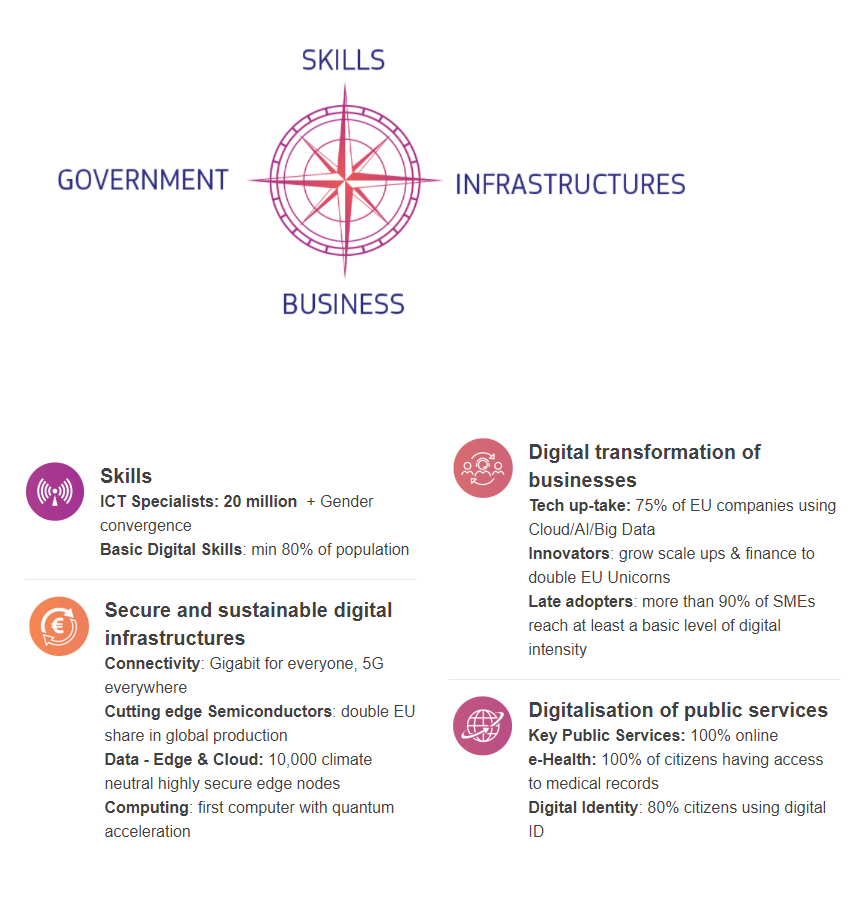Commission sets concrete digital targets for digital infrastructure, businesses and public services
The European Commission recently published a draft decision establishing the 2030 Policy Programme “Path to the Digital Decade”. The policy programme builds on the Commission’s Communication “The 2030 Digital Compass: the European way for the Digital Decade” released in March 2021.
In its Communication, the Commission had proposed “to agree on a set of digital principles, to launch rapidly important multi-country projects, and to prepare a legislative proposal setting out a robust governance through a monitoring and cooperation mechanism with Member States, to ensure progress – the Policy Programme “Path to the Digital Decade (‘Policy Programme’)”. Furthermore, it set out the concrete digital targets which the Union as a whole is expected to achieve by the end of the decade. A public consultation on the roadmap for digital principles and rights was also held earlier this year.
According to the Commission, the policy programme aims to create a governance structure with Member States through a mechanism of annual cooperation between the Union’s institutions and the Member States to ensure that the Union jointly achieves its ambition. The digital targets for 2030 are based around four cardinal points: digital skills, digital infrastructures, digitalisation of businesses and public services.
Digital targets

Article 4 of the draft Decision sets out the digital targets on more detail. The Union institutions and Member States shall cooperate to achieve the following digital targets in the Union by 2030:
(1) a digitally skilled population and highly skilled digital professionals:
- at least 80% of those aged 16-74 have at least basic digital skills;
- at least 20 million employed information and communications technology (ICT) specialists are employed, with convergence between women and men;
(2) secure, performant and sustainable digital infrastructures:
- all European households are covered by a Gigabit network, with all populated areas covered by 5G;
- the production of cutting-edge and sustainable semiconductors in the Union is at least 20% of world production in value;
- at least 10,000 climate neutral highly secure “edge nodes” are deployed in the Union, distributed in a way that guarantees access to data services with low latency (few milliseconds) wherever businesses are located and;
- by 2025, the Union has its first computer with quantum acceleration, paving the way for the Union to be at the cutting edge of quantum capabilities by 2030.
(3) digital transformation of businesses:
- at least 75% of Union enterprises have taken up:
- cloud computing services;
- big data;
- artificial intelligence;
- cloud computing services;
- more than 90% of Union Small and Medium Enterprises (‘SME’) reach at least a basic level of digital intensity;
- the Union grows the pipeline of its innovative scale ups and improves their access to finance, leading to at least doubling the number of unions;
(4) digitalisation of public services:
- 100% online accessible provision of key public services for Union citizens and businesses;
- 100% of Union citizens have access to their medical records (electronic health records (EHR);
- at least 80% of Union citizens use a digital identification (ID) solution.
What will the governance framework look like?
- A structured, transparent and shared monitoring system based on the Digital Economy and Society Index (DESI) to measure progress towards each of the 2030 targets and KPIs;
- An annual report on the ‘State of the Digital Decade’, in which the Commission will evaluate progress and provide recommendations for actions;
- Multiannual digital decade strategic roadmaps for each Member State, in which they will outline policies and measures in support of the 2030 targets;
- A structured annual framework to discuss and address areas of insufficient progress through recommendations and joint commitments between the Commission and the Member States;
- A mechanism to support the implementation of multi-country projects
How will multi-country projects be funded?
- Multi-country projects should be able to attract and combine, in an efficient manner, various sources of Union and Member States’ funding - something which Member States could not do on their own.
- Depending on the needs of the specific multi-country projects, funds from a centrally managed Union programme may be combined with resources committed by Member States, including contributions from the Recovery and Resilience Facility, the Digital Europe Programme, the Connecting Europe Facility, the InvestEU Programme, Horizon Europe, as well as the European Regional Development and the Cohesion funds.
- Member States can contribute to multi-country projects from their regional or national budgets. The European Investment Bank (EIB) and other entities, whether public or private, may contribute to multi-country projects where appropriate. When financial resources are State aid measures, state aid rules apply.
Next steps
Europe’s digital principles and rights will be set out in an inter-institutional solemn declaration between the Commission, the European Parliament and the Council, based on a separate proposal from the European Commission expected in December 2021.
Companies may wish to look further into the digital targets for 2030, the multi-country projects and the financial facilities provided by the Commission to create business opportunities for the industry in the near future.
For further information contact Feyo Sickinghe
Sign up for our Connected newsletter for a monthly round-up from our Regulatory & Public Affairs team.



